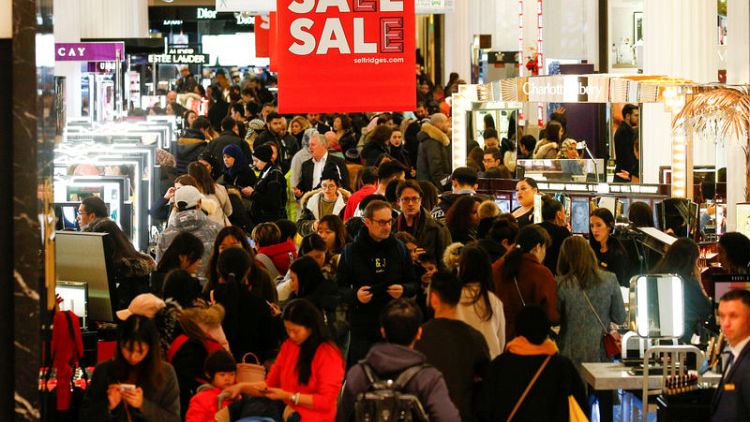By David Milliken
LONDON (Reuters) - Britain will suffer economic damage equivalent to the loss of at least 2-3 years of normal growth between now and the end of 2021 if it leaves the European Union without an exit deal, the International Monetary Fund warned on Tuesday.
The world's fifth-biggest economy could quit the EU as soon as Friday, disrupting its ties with the bloc that it joined 46 years ago, if Prime Minister Theresa May cannot agree a delay with EU leaders on Wednesday.
The IMF said that even in a relatively orderly no-deal Brexit scenario -- with no delays at borders and minimal financial market turmoil -- the economy would grow 3.5 percent less by the end of 2021 than it would under a smoother Brexit.
"The increase in trade barriers has an immediate negative impact on UK foreign and domestic demand," the IMF said.
The EU economy would suffer too but by much less than Britain, facing an estimated 0.5 percent hit to gross domestic product compared with a smooth Brexit scenario, the IMF said.
British exports to the EU and other countries which have trade deals with the bloc would face new tariffs and regulatory barriers if Britain reverted to the World Trade Organisation rules favoured by some Brexit supporters.
Supporters of an abrupt Brexit have accused the IMF of making politically motivated forecasts in the past.
In its report on Tuesday, the fund said a worse-case no-deal Brexit scenario involving border delays and financial market turmoil would increase the damage to about 4 percent of GDP by 2021.
The forecasts took into account the British government's plans not to impose tariffs on most categories of imports in the event of a no-deal Brexit, and also assumed that the Bank of England would cut interest rates.
BoE Governor Mark Carney gave broadly similar estimates of the cost of a no-deal Brexit last month, when he said preparations by government and businesses could mitigate only some of the damage of a no-deal Brexit.
A spokesman for Britain's finance ministry said the government wanted to leave the EU with a deal but was getting ready for a possible no-deal Brexit.
The IMF downgraded its forecast for economic growth in Britain this year to 1.2 percent from a forecast of 1.5 percent it made three months ago, which would be the weakest since 2009.
Growth for 2020 was seen picking up to 1.4 percent, but in both years Britain's economy was predicted to grow less than the euro zone, in contrast to before the 2016 Brexit referendum.
"The downward revisions ... reflect the negative effect of prolonged uncertainty about the Brexit outcome, only partially offset by the positive impact from fiscal stimulus announced in the 2019 budget," the IMF said.
The BoE should take a "cautious, data-dependent" approach to monetary policy, it added.
(Reporting by David Milliken; Editing by William Schomberg)



